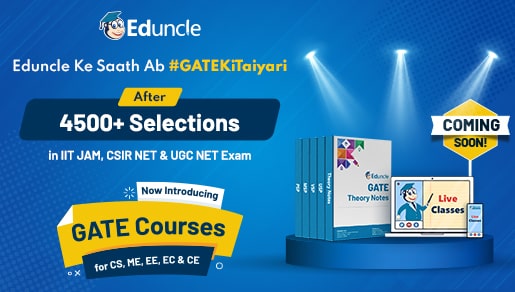Time management is very much important in IIT JAM. The eduncle test series for IIT JAM Mathematical Statistics helped me a lot in this portion. I am very thankful to the test series I bought from eduncle.
Nilanjan Bhowmick AIR 3, CSIR NET (Earth Science)Posts by Anil Meghwal
- 0 Likes
- 1 Comments
- 0 Shares
-
![comment-profile-img]() Muta marriage is a temporary marriage. Muta marriage is recognized in Shia only. Sunni law doesn’t recognize it. A Shia of the male sex may contract a Muta marriage with a woman professing the Mahomedan, Christian or Jewish religion, or even with a woman who is a fire worshipper but not with any woman following any other religion. But a Shia woman cannot contract a Muta marriage with a non muslim.The essentials of Muta marriage are :(1) The period of cohabitation should be fixed.(2) Dower should be fixed.(3) If dower specified, term not specified, it could amount to permanent or regular marriage.(4) If term fixed dower not specified, it amounts to void marriage.T
Muta marriage is a temporary marriage. Muta marriage is recognized in Shia only. Sunni law doesn’t recognize it. A Shia of the male sex may contract a Muta marriage with a woman professing the Mahomedan, Christian or Jewish religion, or even with a woman who is a fire worshipper but not with any woman following any other religion. But a Shia woman cannot contract a Muta marriage with a non muslim.The essentials of Muta marriage are :(1) The period of cohabitation should be fixed.(2) Dower should be fixed.(3) If dower specified, term not specified, it could amount to permanent or regular marriage.(4) If term fixed dower not specified, it amounts to void marriage.T
Anil
Ask, Learn & Lead It- 0 Likes
- 1 Comments
- 0 Shares
-
![comment-profile-img]()
Illustration (b) of Exception 1 of Sec 300 of IPC - X gives grave and sudden provocation to Y. Y, on this provocation, fires a pistol at X, neither intending nor knowing himself to be likely to kill, Z, who is near him, but out of sight. A kills Z. Here Y has not committed murder, but merely culpable homicide.
T
- 0 Likes
- 1 Comments
- 0 Shares
-
![comment-profile-img]() Abetment : Abetment by aid [Sec. 107(3) – by intentionally aiding a person to commit an offenceSedition : Section 124 A of Indian Penal Code, 1860: "Whoever, by words, either spoken or written, or by signs, or by visible representation, or otherwise , brings or attempt to bring into hatred or contempt or excites or attempts to excite disaffection towards the Government established by Law is punishable with imprisonment for life.Affray : According to Section 159 of the Indian Penal Code, 1860: Affray is defined as "When two or more persons by fighting in a public place, disturb the public peace, they are said to commit an affray."Rioting : Section 146 of the Indian Penal Code, 1860: Whenever force or violence is used by an unlawful assembly, or by any member thereof, in prosecution of the common object of such assembly, every member of such assembly is guilty of the offence of rioting.T
Abetment : Abetment by aid [Sec. 107(3) – by intentionally aiding a person to commit an offenceSedition : Section 124 A of Indian Penal Code, 1860: "Whoever, by words, either spoken or written, or by signs, or by visible representation, or otherwise , brings or attempt to bring into hatred or contempt or excites or attempts to excite disaffection towards the Government established by Law is punishable with imprisonment for life.Affray : According to Section 159 of the Indian Penal Code, 1860: Affray is defined as "When two or more persons by fighting in a public place, disturb the public peace, they are said to commit an affray."Rioting : Section 146 of the Indian Penal Code, 1860: Whenever force or violence is used by an unlawful assembly, or by any member thereof, in prosecution of the common object of such assembly, every member of such assembly is guilty of the offence of rioting.T
- 0 Likes
- 1 Comments
- 0 Shares
-
![comment-profile-img]() The Hindu Adoptions and Maintenance Act, 1956Section 18. Maintenance of wifeSubject to the provisions of this section, a Hindu wife, whether married before or after the commencement of this Act, shall be entitled to be maintained by her husband during her life time.Section 19. Maintenance of widowed daughter-in-law :A Hindu wife, whether married before or after the commencement of this Act, shall be entitled to be maintained after the death of her husband by her father-in-law:PROVIDED and to the extent that she is unable to maintain herself out of her own earnings or other property or, where she has no property of her own, is unable to obtain maintenance :(a) from the estate of her husband or her father or mother, or(b) from her son or daughter, if any, or his or her estate.Section 22. Maintenance of DependantsSubject to the provisions of sub-section (2) the heirs of a deceased Hindu are bound to maintain the dependants of the deceased out of the estate inherited by them from the deceased.Section 23 of the Maintenance and Welfare of Parents and Senior Citizens Act, 2007, provides as follows – Transfer of property to be void in certain circumstances :(1) Where any senior citizen who, after the commencement of this Act, has transferred by way of gift or otherwise, his property, subject to the condition that the transferee shall provide the basic amenities and basic physical needs to the transferor and such transferee refuses or fails to provide such amenities and physical needs, the said transfer of property shall be deemed to have been made by fraud or coercion or under undue influence and shall at the option of the transferor be declared void by the tribunal.(2) Where any senior citizen has a right to receive maintenance out of an estate and such estate or part thereof is transferred, the right to receive maintenance may be enforced against the transferee if the transferee has notice of the right, or if the transfer is gratuitous; but not against the transferee for consideration and without notice of right.T
The Hindu Adoptions and Maintenance Act, 1956Section 18. Maintenance of wifeSubject to the provisions of this section, a Hindu wife, whether married before or after the commencement of this Act, shall be entitled to be maintained by her husband during her life time.Section 19. Maintenance of widowed daughter-in-law :A Hindu wife, whether married before or after the commencement of this Act, shall be entitled to be maintained after the death of her husband by her father-in-law:PROVIDED and to the extent that she is unable to maintain herself out of her own earnings or other property or, where she has no property of her own, is unable to obtain maintenance :(a) from the estate of her husband or her father or mother, or(b) from her son or daughter, if any, or his or her estate.Section 22. Maintenance of DependantsSubject to the provisions of sub-section (2) the heirs of a deceased Hindu are bound to maintain the dependants of the deceased out of the estate inherited by them from the deceased.Section 23 of the Maintenance and Welfare of Parents and Senior Citizens Act, 2007, provides as follows – Transfer of property to be void in certain circumstances :(1) Where any senior citizen who, after the commencement of this Act, has transferred by way of gift or otherwise, his property, subject to the condition that the transferee shall provide the basic amenities and basic physical needs to the transferor and such transferee refuses or fails to provide such amenities and physical needs, the said transfer of property shall be deemed to have been made by fraud or coercion or under undue influence and shall at the option of the transferor be declared void by the tribunal.(2) Where any senior citizen has a right to receive maintenance out of an estate and such estate or part thereof is transferred, the right to receive maintenance may be enforced against the transferee if the transferee has notice of the right, or if the transfer is gratuitous; but not against the transferee for consideration and without notice of right.T
- 0 Likes
- 1 Comments
- 0 Shares
-
![comment-profile-img]()
Dualistic Theory also called Pluralistic Theory, says both the laws are separate and different. Individual is the subject of Municipal Law. State is the subject of International Law. Municipal Law is the result of will of people of the state. International Law is the result of the common will of all the States. Municipal Law differs from one State to another. International Law is common and similar to all the States. Supporters of this theory include: Anzilloti, Oppenheim, Triepel etc.
T
- 0 Likes
- 1 Comments
- 0 Shares
-
![comment-profile-img]()
There are two main theories of the function of rights: the will theory and the interest theory. Each theory presents itself as capturing an ordinary understanding of what rights do for those who hold them. Which theory offers the better account of the functions of rights has been the subject of spirited dispute, literally for ages.
T
- 0 Likes
- 1 Comments
- 0 Shares
-
![comment-profile-img]()
The defence of non est factum is most obviously important in two situations. The first is where a party has signed the supposed contract as the result of the fraud of a third party and the other party to the contract has no actual knowledge or reason to know of, the fraud. For example, in United Dominions Trust Ltd v Western’ the defendant signed a blank hire-purchase proposal form and the dealer filled in incorrect figures before dispatching it to the finance company. The second is where the fraud has been committed by the other party to the alleged contract or deed and a third party has then relied on the document. In Saunders v Anglia Building Society an elderly lady signed what she believed to a be a deed of gift to her house to her nephew but which was in fact an assignment on sale to a third party who mortgaged the house to the defendants and kept the proceeds. If the case is one of fraud or misrepresentation by the other party to the contract, with no third party involved, the majority in the Court of Appeal in Lloyds Bank Plc v Waterhouse’ said that the case should be dealt with as one of misrepresentation. Alternatively, where the other party knew that the document did not represent the intention of the party signing it, the latter may have a remedy for unilateral mistake.
T



























Both (A) and (R) are correct, and (R) is the correct explanation of (A).